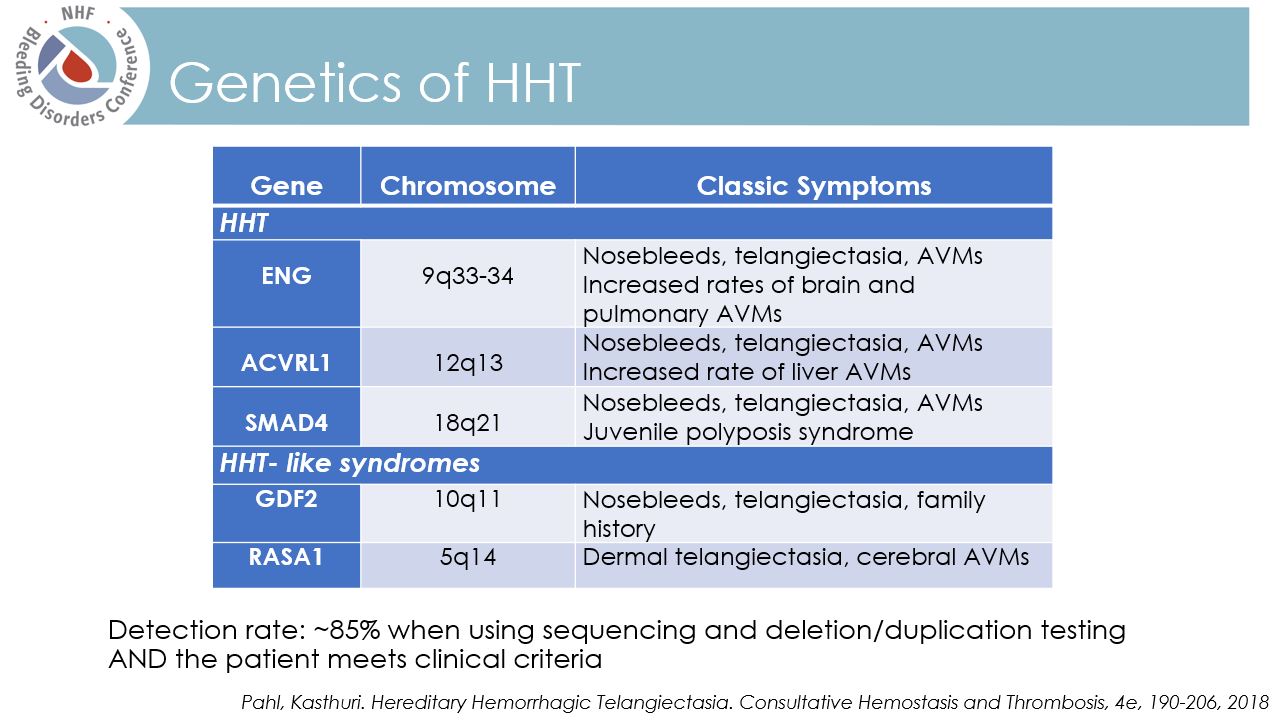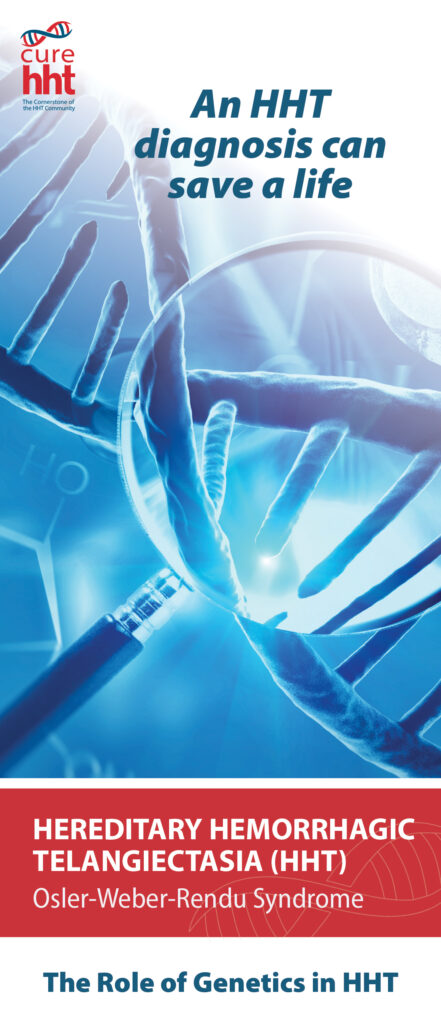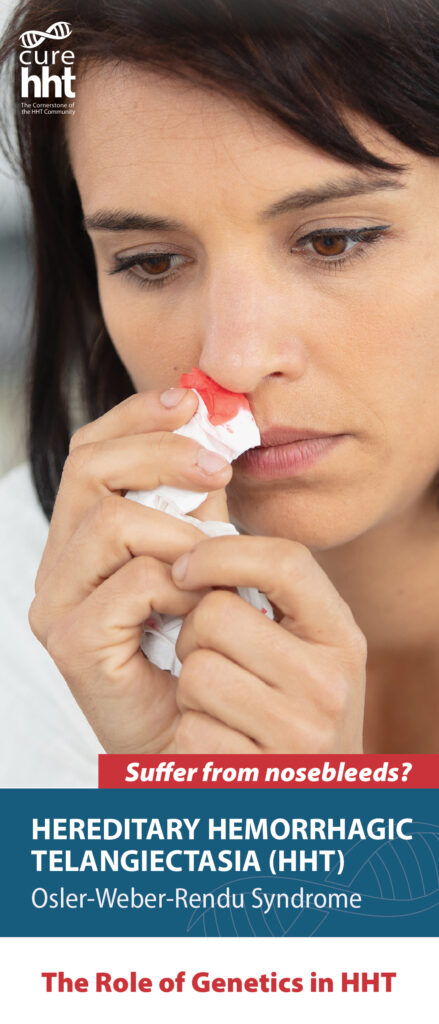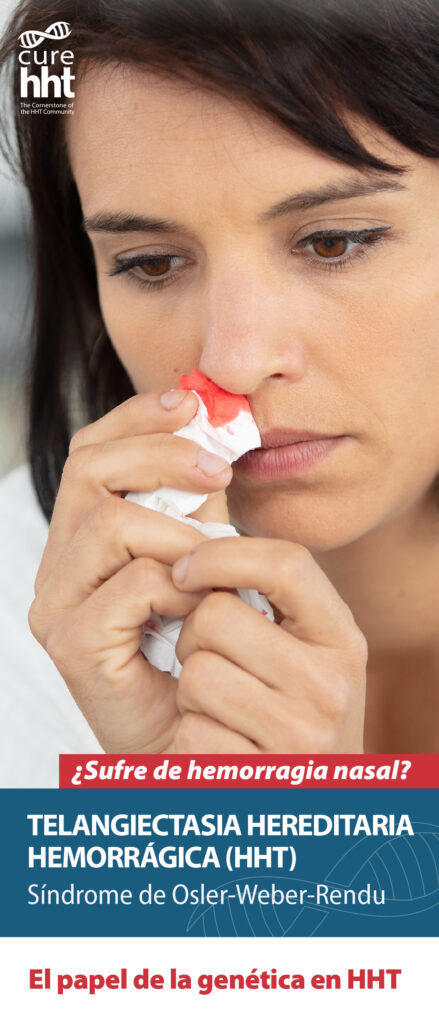Genetics of HHT
What are Genetics?
- Gene: The basic unit of inheritance, often referred to as traits that are “passed down”. Genes are sections of your DNA.
- Variant: Sometimes called a “mutation”, it is a change in someone’s DNA that is “abnormal.” Variants may cause a gene to work improperly and lead to a disease such as HHT.
- Gene Expression: Genes can be “turned on” to make products/proteins for the body. Expression is the “turning on” of genes.
- Capillary: The meeting place of arteries and veins. Blood travels through capillary regions slowly so that nutrients like oxygen can be delivered to the body.
- AVM: “Arteriovenous malformation,” a direct connection between an artery and vein without a capillary. Blood travels through these quickly so nutrients are not delivered properly, and they are more prone to burst which causes random and potentially dangerous bleeding. AVMs are a common symptom of HHT.
- Telangiectasia: Small 1-2mm red spot often on the mouth, hands, and insides. Usually harmless, but a visible symptom of HHT in many older patients.
Learn more about the role of genetics in HHT by downloading one of our latest brochures below. Please note that one is provider focused and the other is patient focused.
HHT-associated genes
- Approximately 90% of HHT cases are caused by alterations in the ENG (HHT type 1) or ACVRL1 (HHT type 2) gene
- 3-5% of clinically diagnosed individuals test positive for a mutation in the SMAD4 gene, which causes a combined syndrome of HHT and Juvenile Polyposis
- About 10-15% of patients will not have a mutation detected in a known HHT gene, and in these cases a diagnosis is made based on clinical evaluation alone*
- Although a handful of people in the world with HHT have been reported to have a mutation in the BMP9/GDF2 gene, it is so rare (<<1%) that it is not typically a part of routine genetic testing for HHT.
*Because 15% of people diagnosed with HHT do not have a mutation in one of the identified HHT genes, a negative genetic diagnosis does not necessarily mean that a person does not have HHT. There are likely other genes that cause the symptoms of HHT that have not yet been identified.
Genetics of HHT

Inheritance Pattern for HHT
HHT is an autosomal dominant genetic disorder. This means that if a parent has HHT, no matter the parent or child’s gender, each of the children will have a 50% chance of having HHT.
Every person has two copies of every gene, one copy comes from their mother and one copy comes from their father. A person with HHT has one mutated copy of an HHT-associated gene and one normal copy, the mutated copy causes their HHT. When a person with HHT has a child, they have a 50% chance of passing on the normal copy of the gene and a 50% chance of passing on the copy of the gene that causes HHT. A child who inherits the HHT-causing gene will have HHT, while a child who inherits the normal copy of the HHT gene will not have HHT. Therefore, each time an HHT affected person has a child, there is a 50% (1 in 2) chance that the child will have HHT
Nearly everyone with HHT will have inherited the disorder from a parent who also has HHT. In very rare cases, a change in an HHT gene occurs for the first time in the egg or sperm cell of someone who does not have HHT themselves. In these cases, the resulting child will have HHT, even though the parents do not.



